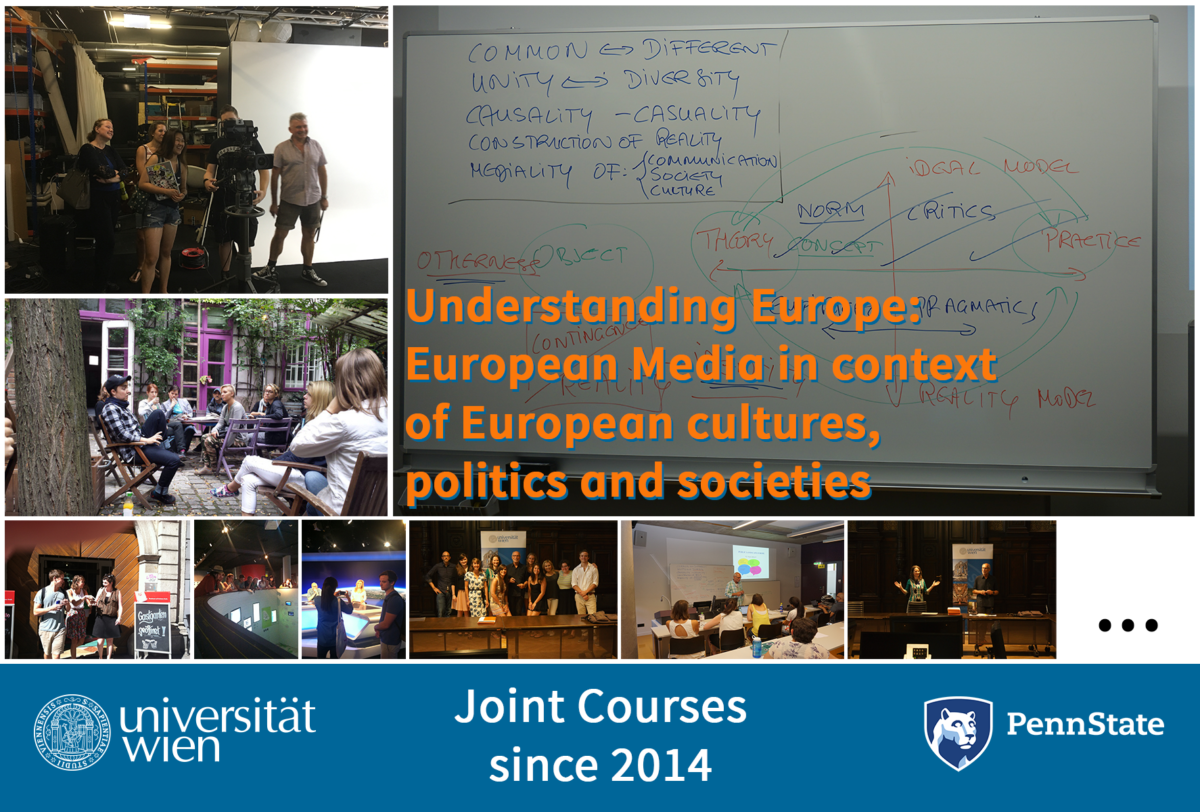Since August 2014 the University of Vienna and the PennState University collaborate on Joint Courses at the Department of Communication during Summer Time.
Position: Course Coordination / Teaching Assistance / Tutoring
Lectures about “Why to do Social Science” & “Introduction to Methods”
Summer 2014 / 2015 / 2016 / 2017 / 2018 / 2019
To understand Europe, first of all, one has to understand there is no simple answer to questions about Europe. Europe is and always was a place of big diversity, different cultures, multiple historical narrations, societal value systems and last but not least systems of communication within nations and Europe. This course starts with an introduction of communication and media systems within and across the European Union. To understand the differences but also similarities between these systems the theoretical concept of Media Culture(s) will be proposed and discussed. After these descriptive and theoretical lectures, additional lectures are dedicated to discussing practices, knowledge, and examples that bridge these borders within Europe.
Course Instructors
emer. o. Univ.-Prof. Dr. Thomas A. Bauer (UniVie)
Ines Meyer-Hoess (PSU)
Learning Objectives
- Understanding media and society as (transactional) interconnected entities.
- Using communication theory as media literacy for critical and emancipatory thinking
- Understanding media as a culture of communication.
- Approaching communication as observation of media processes.
- Understanding Communication Science as a discipline dedicated to the observation of human communication.
- Understanding theories as abstract, yet interconnected descriptions and tools for observing and shaping communication.
- Understanding empirical communication research and strengthening practical skills in this field.
- Understanding Europe from the inside and reflect existing expectations of it.
Joint Courses Design
In the last years two courses – one of each University – were conceptualized to intertwine. UniVie students (Master Level) used the course as an opportunity to (learn to) teach media studies related topics, based on an annually changed concept to reflect the number of participants
UniVie students (Master Level) used the course FOSE (Research Seminare) as an opportunity to (learn to) teach media studies related topics, based on an annually changed concept to reflect the number of participants from each University and latest developments. They also practiced comparative analysis of the media systems, culture and practice in Europe and the United States.
PSU students (Undergraduate Level) had an introductory course to “Communication in the European Union. Politics, Policies, and Practices” that consisted of
- Lectures on “Media Theory and Media Philosophy”
- above mentioned Learning Modules by UniVie students – mostly based on more practical topics (e.g. Public Value, Community Media, Welfare State,…)
- Lectures on “Methods of Social Science” and/or “Why to do Social Science”
- Excursions to Media Organizations, Institutions of the European Union and/or Facilities of Austrian Digital Art, Creative Industries & Culture
This PSU course was accompanied by a second course about “Intercultural Communication in Action: The Case of Austria” that introduced Austrian Culture, History, and Communication. UniVie students who joined single classes had the opportunity to see how their own culture, nation, and history was imparted to foreigners and so they had the chance to learn much about their own heritage through the eyes of strangers.
Picture (C): PSU / UniVie / Ines Meyer-Hoess / Veronica Hicks / Michael-Bernhard Zita

